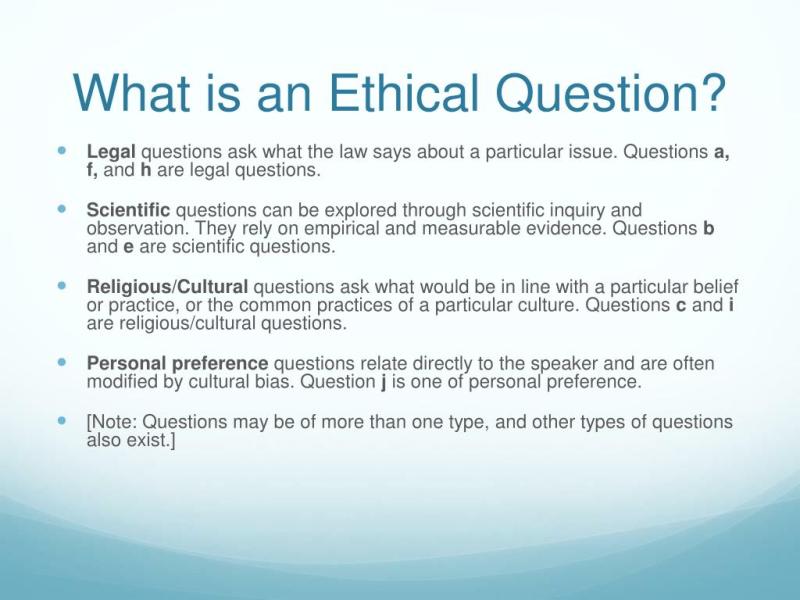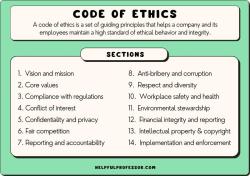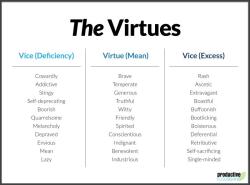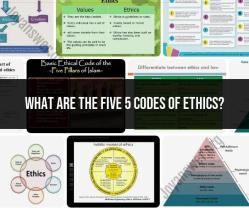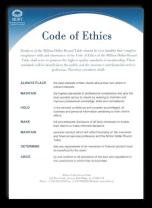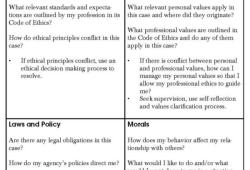What is an ethical question?
An ethical question is a query or inquiry that prompts individuals to consider the morality or rightness and wrongness of a particular action, decision, situation, or behavior. These questions are designed to explore and examine the ethical implications, values, and principles involved in a given scenario. Ethical questions often require individuals to reflect on their beliefs, values, and moral reasoning to make informed and principled decisions.
Key characteristics of ethical questions include:
Morality and Values: Ethical questions involve considerations of morality, which is concerned with distinguishing between right and wrong. They often touch upon fundamental human values, such as honesty, fairness, justice, integrity, and empathy.
Complexity: Ethical questions are often complex and multifaceted, involving competing interests, conflicting values, or situations where there is no clear-cut right or wrong answer. Resolving ethical questions may require careful analysis and nuanced thinking.
Dilemmas: Ethical questions may present dilemmas where individuals are forced to choose between competing moral principles or face situations where different ethical considerations are in tension.
Personal Reflection: Answering ethical questions requires individuals to engage in personal reflection and introspection. It involves considering one's own beliefs, values, and principles and how they apply to a specific situation.
Application of Ethical Theories: Ethical questions may be analyzed through the lens of ethical theories or frameworks, such as deontology, consequentialism, virtue ethics, or others. These theories provide systematic ways of approaching ethical dilemmas.
Examples of ethical questions span a wide range of contexts and can include issues related to business ethics, medical ethics, environmental ethics, personal relationships, societal norms, and more. Here are a few examples:
- Is it ethical to sacrifice individual privacy for the sake of national security?
- Should a company prioritize profit over environmental sustainability?
- Is it morally acceptable to lie to protect someone's feelings?
- What are the ethical implications of using emerging technologies in ways that could potentially harm society?
Engaging with ethical questions fosters critical thinking, ethical reasoning, and a deeper understanding of the moral dimensions of our choices and actions. It encourages individuals to consider the broader consequences and ethical implications of their decisions on themselves and others.
What moral principles guide ethical decision-making in scientific research?
Ethical decision-making in scientific research is guided by a set of core moral principles. These principles are crucial for ensuring the integrity of research, protecting participants and stakeholders, and maintaining public trust in science. Here are some key principles:
1. Beneficence:
- Maximize benefits: Scientists strive to conduct research that has the potential to do good, contribute to knowledge, and improve lives. This means considering the potential benefits for participants, society, and future generations.
- Minimize harms: Researchers must actively minimize potential risks and harms to participants, animals, and the environment. This involves careful planning, informed consent, and ongoing risk assessment and mitigation strategies.
2. Respect for persons:
- Autonomy: Participants have the right to make informed decisions about their participation in research. This includes access to clear information about the research, potential risks and benefits, and the freedom to withdraw at any time.
- Justice: Research should be conducted fairly and equitably. This means avoiding discrimination against any group or individual and ensuring that the benefits and burdens of research are distributed justly.
3. Integrity:
- Honesty: Researchers must be honest in their research practices, data collection, and reporting. This includes avoiding fabrication, falsification, plagiarism, and misleading interpretations of results.
- Objectivity: Research should be conducted objectively, free from bias and conflicts of interest. This means using rigorous methods, acknowledging limitations, and being transparent about any potential influences on the study's findings.
4. Public responsibility:
- Social and environmental responsibility: Researchers have a responsibility to consider the broader societal and environmental implications of their work. This includes minimizing negative impacts, ensuring public accountability, and sharing research findings in a way that benefits society.
- Accountability: Researchers are accountable to their peers, funding agencies, and the public for the ethical conduct of their research. This involves adhering to research ethics guidelines, reporting misconduct, and participating in open communication about their work.
It's important to note that these principles are often not independent; they may conflict with each other, requiring careful consideration and ethical decision-making in specific situations. Researchers rely on these principles, alongside formal ethical frameworks and guidance from ethics committees, to navigate the complex moral landscape of scientific research.
I hope this provides a good overview of the key moral principles guiding ethical decision-making in scientific research. If you have any further questions about specific principles or their application in different research contexts, feel free to ask!
